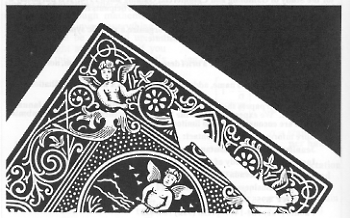
Years ago at the start of the poker boom, I had an idea and outlined a yet unfinished novel about a huge-prize-money televised poker tournament where the hole-card feed was compromised and a player won through cheating. My message was that it wasn’t inconceivable that this could occur and tournament organizers and TV producers needed to be extremely vigilant in making sure this couldn’t happen.
From its beginnings in America, poker suffered from a reputation as a game populated with cheaters. In fact, in his book Cowboys Full, Jim McManus describes how, in the early days of poker in America, it was widely known as the “cheating game.” (I wrote a blog post about this a few years ago.)
When poker exploded on the Internet, the majority of players were high-school and college kids, many of whom were unwise to the realities of the world, especially where money is involved. Exposed hole-card scandals at online sites Absolute Poker and UltimateBet, as well as many other types of Internet cheating, wised them up quickly and greatly damaged confidence in the integrity of online poker.
One of the popular aspects of the poker boom was a plethora of TV poker shows, such as “High-Stakes Poker” and “Poker After Dark,” as well as expanding coverage of the World Series of Poker, the World Poker Tour, and other major events. These shows used technology to enable the viewing audience to be part of the action by being shown the players’ hole cards. They also depended on players and viewers trusting that the hole-card information was secure from other players at a table. In my book outline, the cheating was done through someone in the TV control room, who knew the hole cards and electronically signaled his cohort at the table.
After poker’s Black Friday on April 15, 2011, when the U.S. government shut down the major online sites, brick-and-mortar poker was pretty much the only game in town for American poker fans and these poker shows had an avid following.
Fast forward to 2019 when the Mike Postle scandal erupted. It concerned a livestream cash game at Stones Casino in Sacramento, where Postle seemed to make every right decision over a period of time and was seen as acting suspiciously at the table, indicating that he might be getting information about his opponents’ hands (the story is told in Chapter 48 of Huntington Press’ recently published The 50 Greatest Stories in Poker History). People in the TV control room, as well as the commentators, generally have the hole-card information, as they did in the Postle situation. One of the commentators, Veronica Brill, leveled the charges, posting an 18-minute video presenting her evidence. Poker Internet chatrooms exploded. It was even covered on ESPN’s “Sports Center.” While no charges were filed and lawsuits were dismissed, it was a major black eye for live poker.
Another major scandal erupted recently, concerning the livestream of the popular Hustler Casino live-poker show. A relative novice player named Robbi Jade Lew made a seemingly absurd call in a huge pot against top-pro Garrett Adelstein that set the poker world on fire once again. There’s an ongoing deep investigation into this incident and I don’t know what the final conclusion will be. But the accusations alone are another black eye for poker’s reputation.
Here’s a youtube link to the Hustler hand. The hand in question starts around the 2-minute mark:
A lot of other videos on YouTube show various players’ reactions and investigations into scandal.
Poker has been in a downswing since the government shut down access to the major offshore sites, such as PokerStars, for Americans in 2011. The one thing that has kept poker in the public eye is the televised and streamed poker shows. If the viewing public loses confidence in the integrity of those games, it may cause a further erosion of poker’s popularity.
In all the incidents I’ve mentioned, the cheaters were caught, because they made plays that made no poker sense. At Absolute Poker and UltimateBet, absurd plays sounded the alarm. At Stones Casino, Postle seemed to play too perfectly for a long while before it was noticed and he was called out. And the incident at Hustler was triggered by a nonsensical play.
In all the cases where cheating was alleged by way of a player knowing the opponents’ hole cards, if there was, in fact, cheating and the cheaters were smart about it, they would have used the information very selectively, slowly grinding out a profit, and would never have made plays that raised any suspicions. In fact, it wouldn’t surprise me if smart cheaters are out there operating now and perhaps have been for a long time.
Being reactive rather than foreseeing and acting to prevent bad scenarios seems to be the human condition, especially when the cost of preventative measures is hard to justify to investors. We didn’t secure airplane-cockpit doors until after 9/11. Likewise with inspecting shoes after shoe-bomber incidents. The two live-poker instances cited in this post happened in relatively minor poker events. There have never been accusations in televised major events like the World Series of Poker. Hopefully, that’s because those producers have been extremely vigilant in assuring the integrity of their broadcasts. But if the producers and owners of these live cash-game shows don’t take the steps, and allocate the funds necessary, to ensure players are protected from cheaters, square players will refuse to participate, TV audiences will tune out and poker’s black eye will never heal.